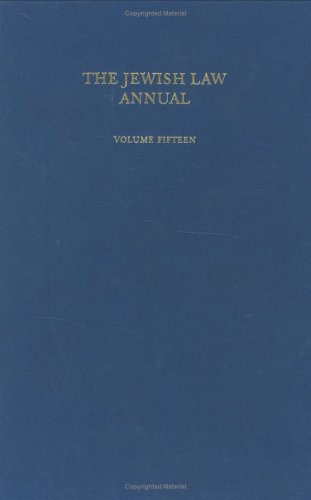|
|
楼主 |
发表于 2008-9-20 03:05:38
|
显示全部楼层
http://rapidshare.com/files/146187522/0415340047.zip
http://www.filefactory.com/file/530bae/n/0415340047_zip
http://ifile.it/yq2t0pe/0415340047.zip

The Jewish Law Annual: Volume 15 (Jewish Law Annual)
By Inst Of Jewish
--------------------------------------------------------------------------------
Publisher: Routledge
Number Of Pages: 208
Publication Date: 2004-05-10
ISBN-10 / ASIN: 0415340047
ISBN-13 / EAN: 9780415340045
Binding: Hardcover
--------------------------------------------------------------------------------
Product Description:
This volume presents a selection of articles by acclaimed experts in their respective areas of Jewish law.
A fascinating account of the status among the Jews of Yemen of the two principal codexes of Jewish law, Maimonides' Mishne Torah and R. Joseph Caro's Shulhan Arukh, is presented in a paper by Yosef Tobi. He explains the historical, social and political background against which Maimonides' code lost its unrivaled primacy as the authoritative legal source among the Yemenites. His explanation situates the Code--Shulhan Arukh rivalry within the context of a broader tension, that between the unique local baladi rite of the Yemenites, and the 'imported' but more mainstream shami rite. As the article notes, despite everything, the former not only managed to retain some standing, but has, to a degree, begun to regain ground.
Two of the papers consider the work of Israeli scholar H. Dagan in the area of unjust enrichment, inquiring into the degree to which Dagan's analysis of the halakhic attitude to unjust enrichment is in fact correct. The late Irwin Haut's paper asks whether the stance of Jewish law on unjust enrichment is as far from that evinced by American law as Dagan claims; Jonathan Blass's paper considers whether an inference can be drawn from the laws of unjust enrichment to the liberal socio-economic vision for society Dagan attributes to the halakha.
The judicial process is the focus of two other papers. Shimshon Ettinger explores the question of whether judges who have, by happenstance, witnessed an incident that subsequently becomes the subject of legal proceedings, can sit in judgment without hearing the testimony of additional witnesses. He demonstrates that the classic commentaries on the Talmud are not in agreement as to the acceptability of witnesses serving as judges. Steven H. Resnicoff considers the thorny problem of what is to be done when recourse to lying and deceit in legal proceedings is the only means by which a just outcome can be secured. Can good ends justify evil means? Resnicoff opens his discussion with a short survey of the views of philosophers such as Augustine and Kant, before proceeding to a comprehensive account of the many halakhic discussions on recourse to deceit to procure just outcomes in civil cases.
A survey of the views of the great philosophers also opens a paper by Yehiel Kaplan on the propriety of using imprisonment to enforce divorce judgments in Jewish law. He cites classic philosophical understandings of liberty to contextualize his thorough account of the position of Jewish law on curtailing personal freedom by imprisonment as a means of inducing recalcitrant husbands to agree to release their 'chained wives' (agunot). This issue is currently at the top of the agenda for many feminist groups within Orthodox Judaism, and Kaplan's paper seeks to maximize the scope for halakhic solutions to this pressing problem.
A chronicle section analyzes American cases that raise significant Jewish issues, and Israeli decisions in cases where Jewish law is germane, thereby making the annual a journal of record. The volume concludes with a survey of recently published articles and books on Jewish and biblical law. |
|